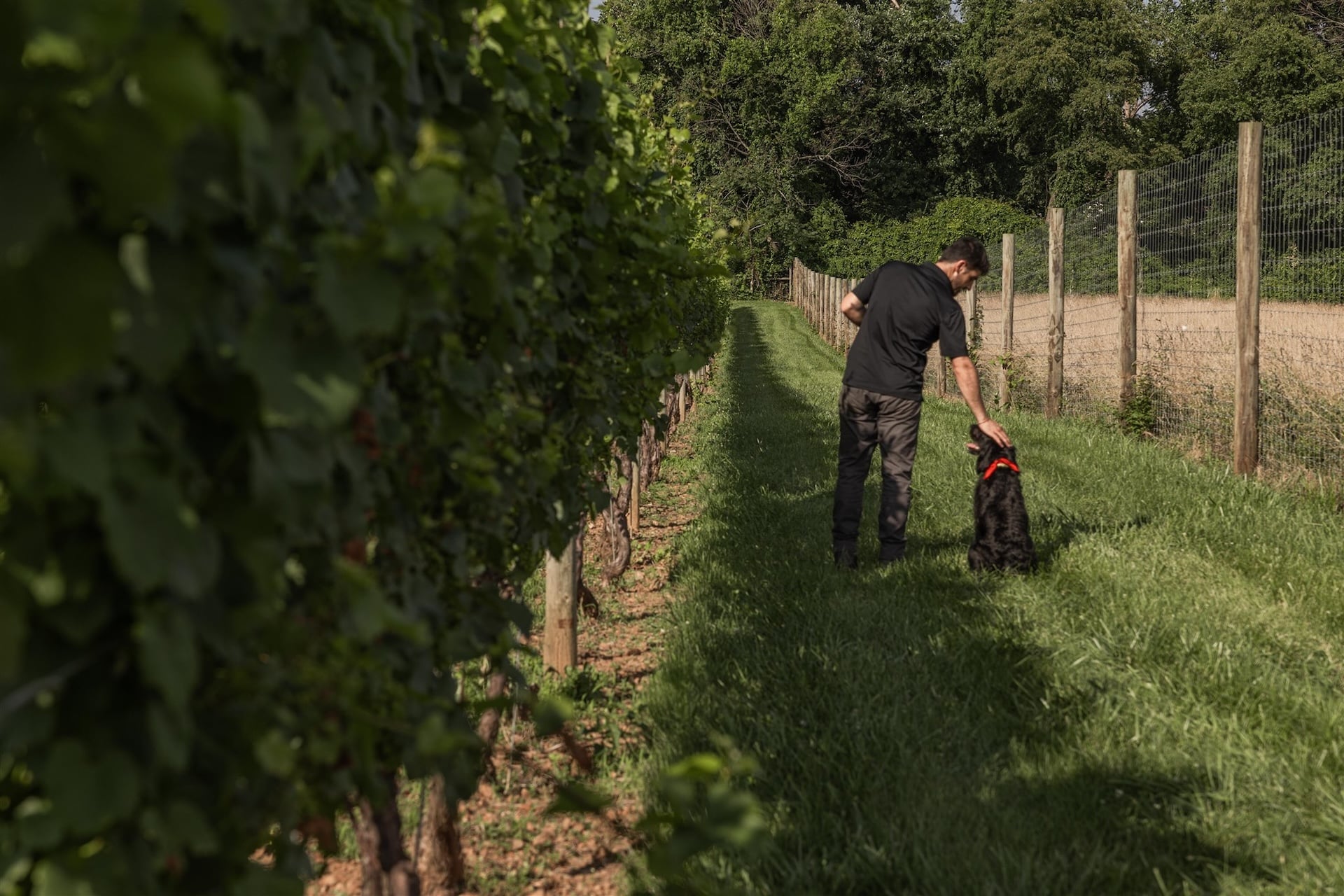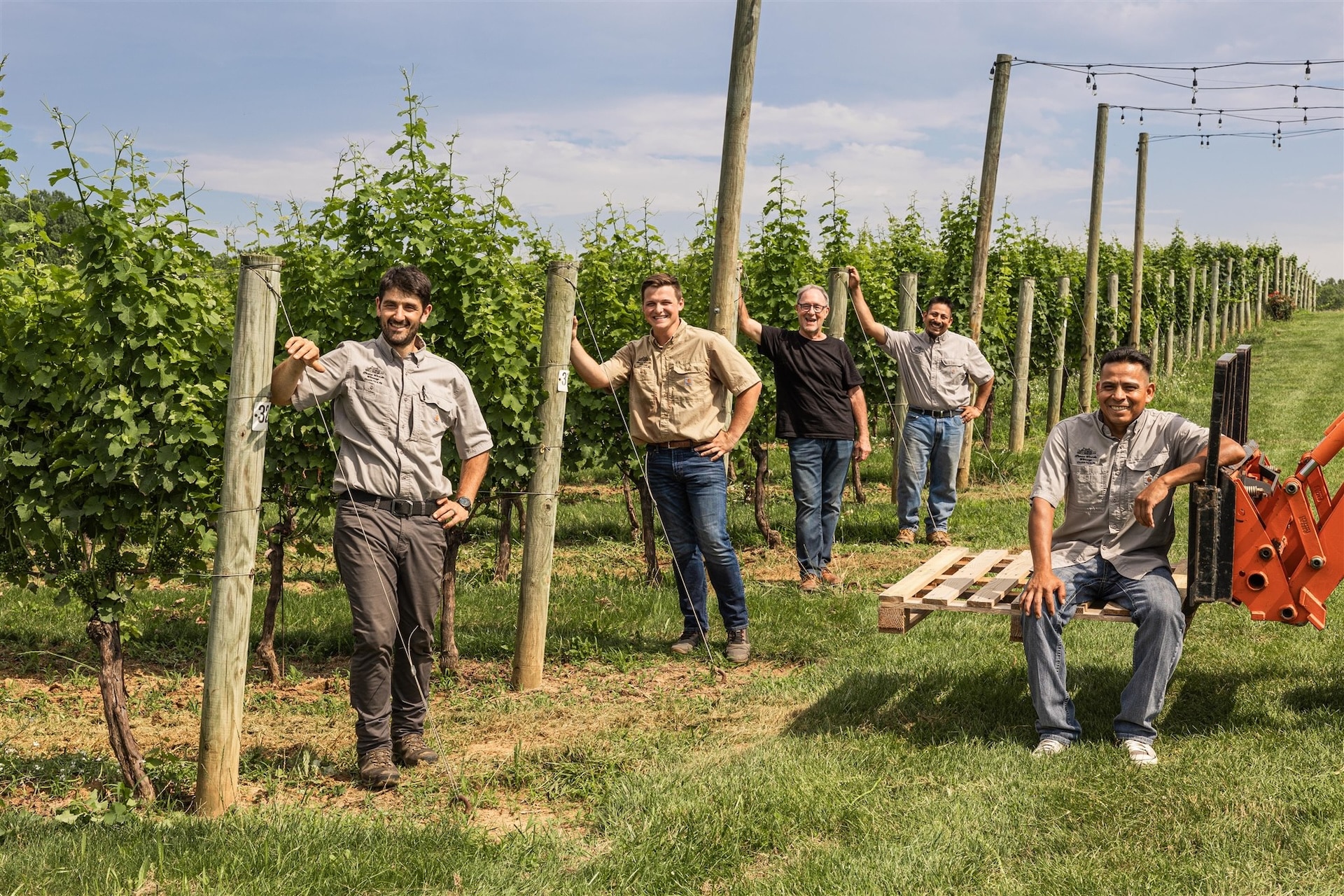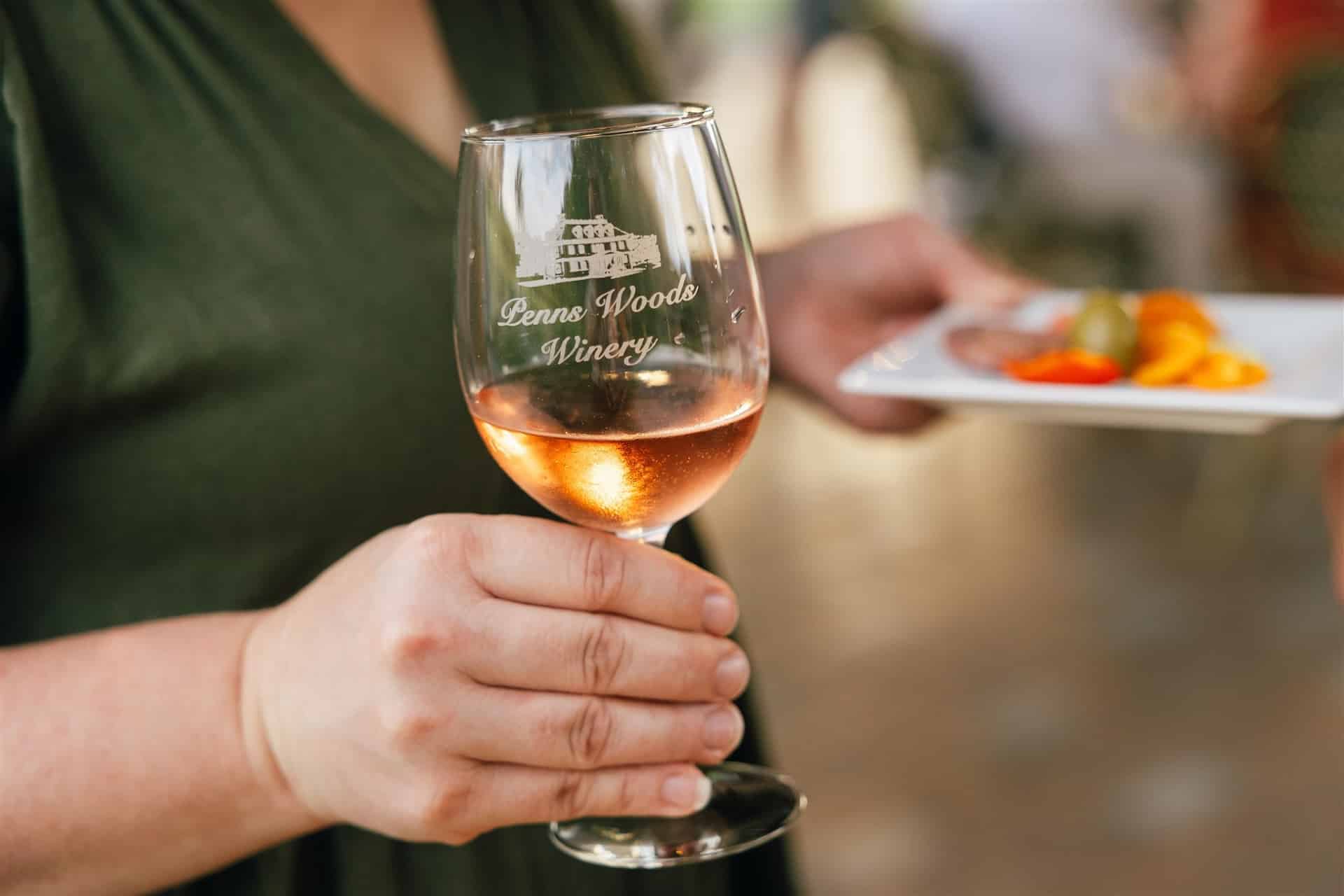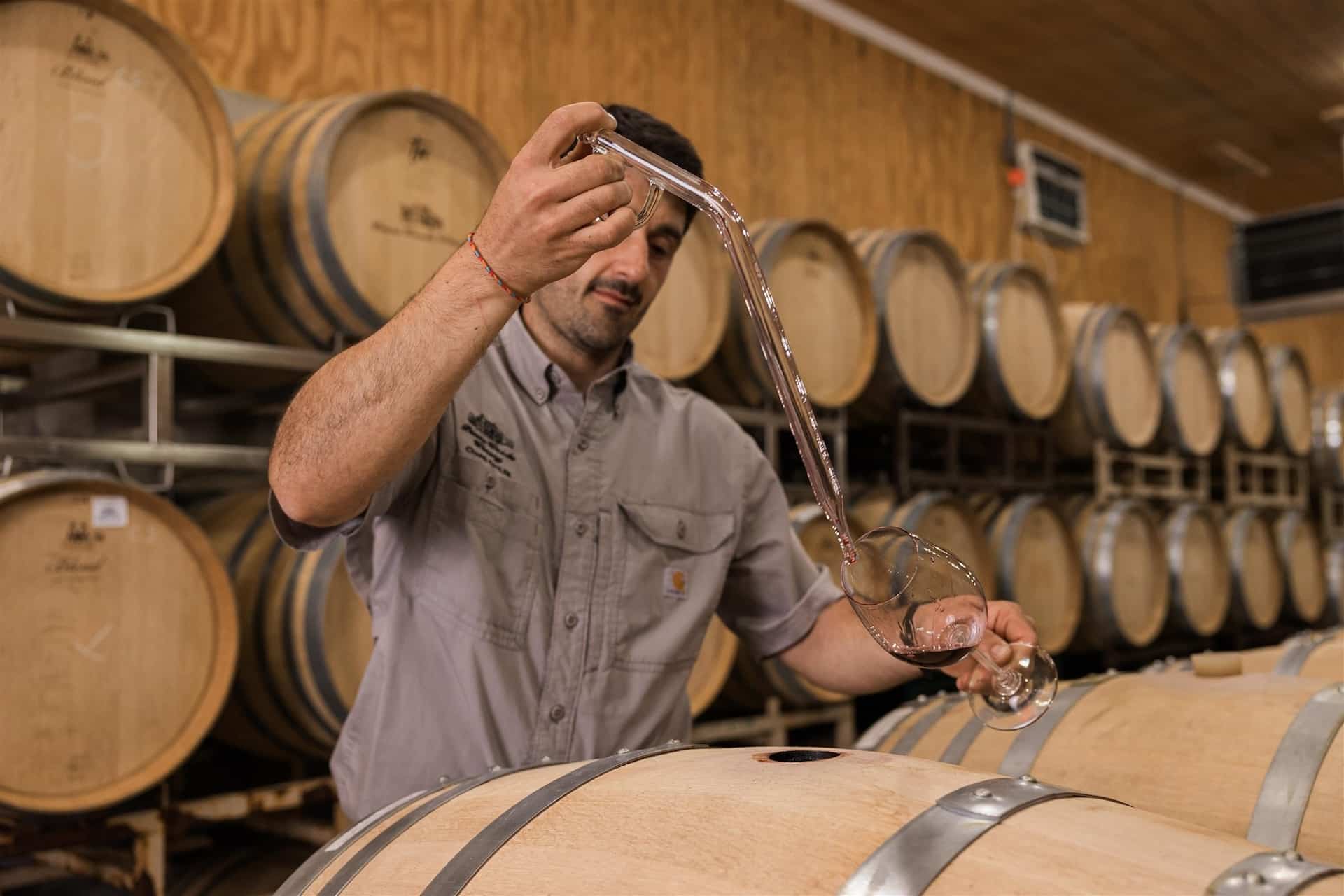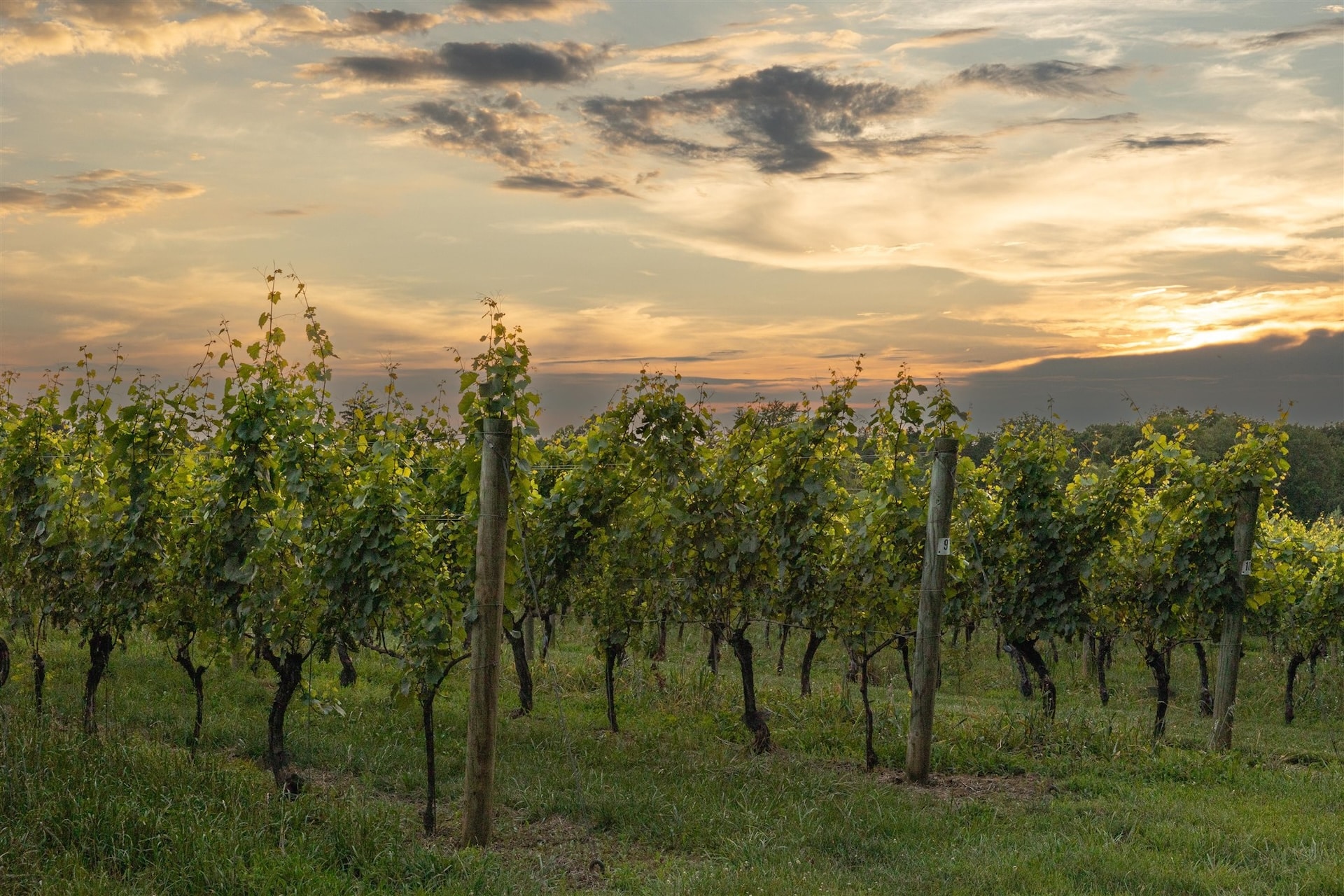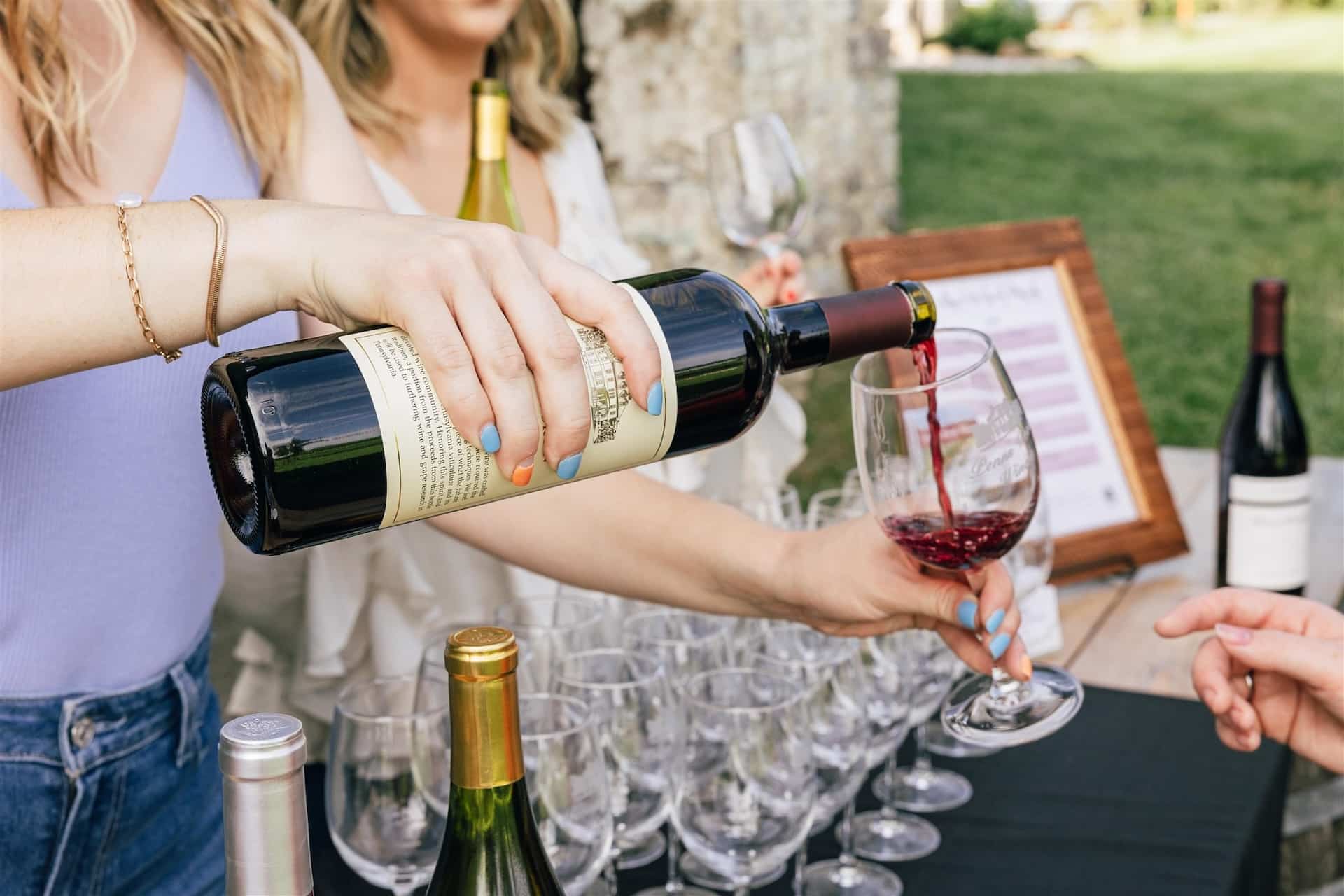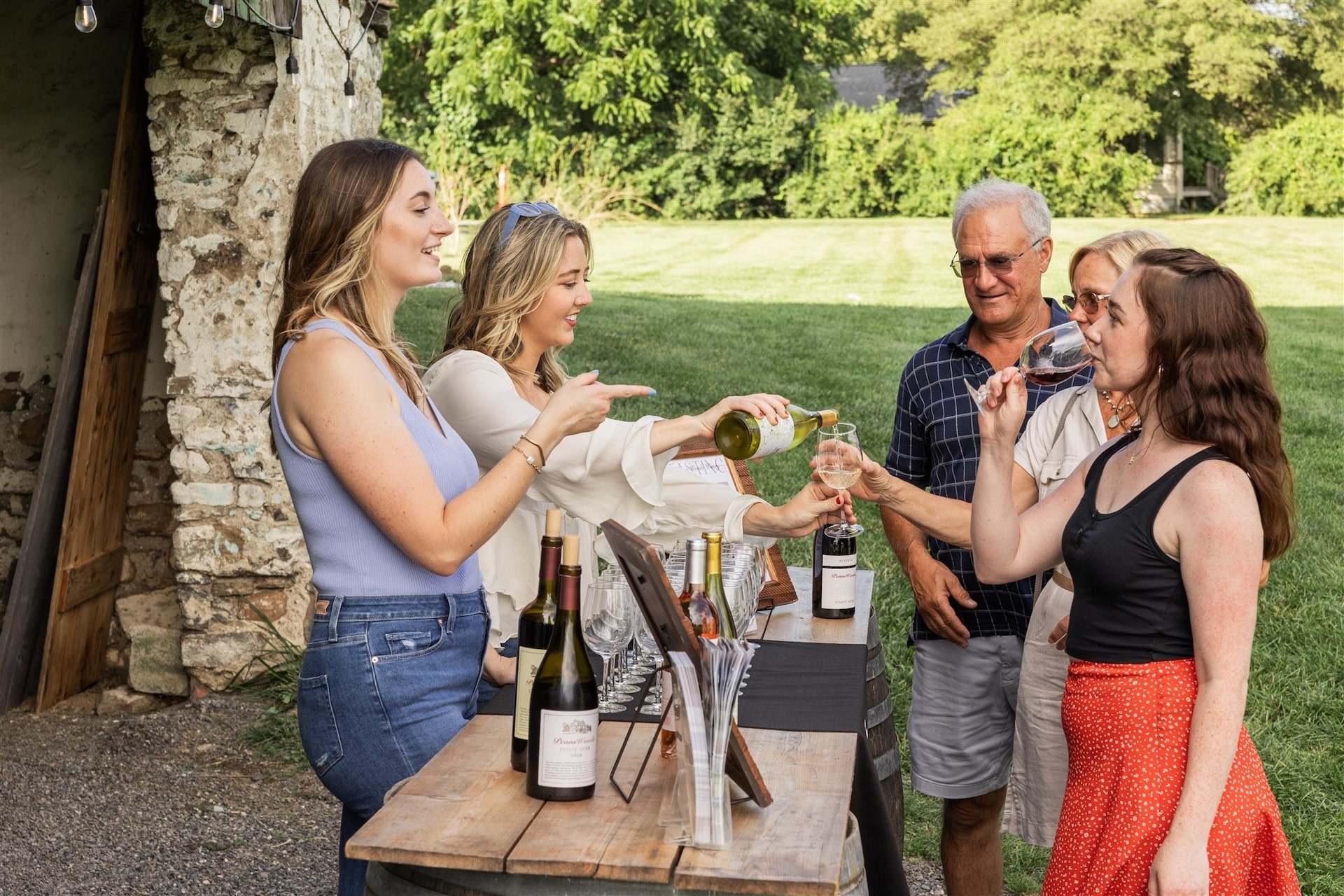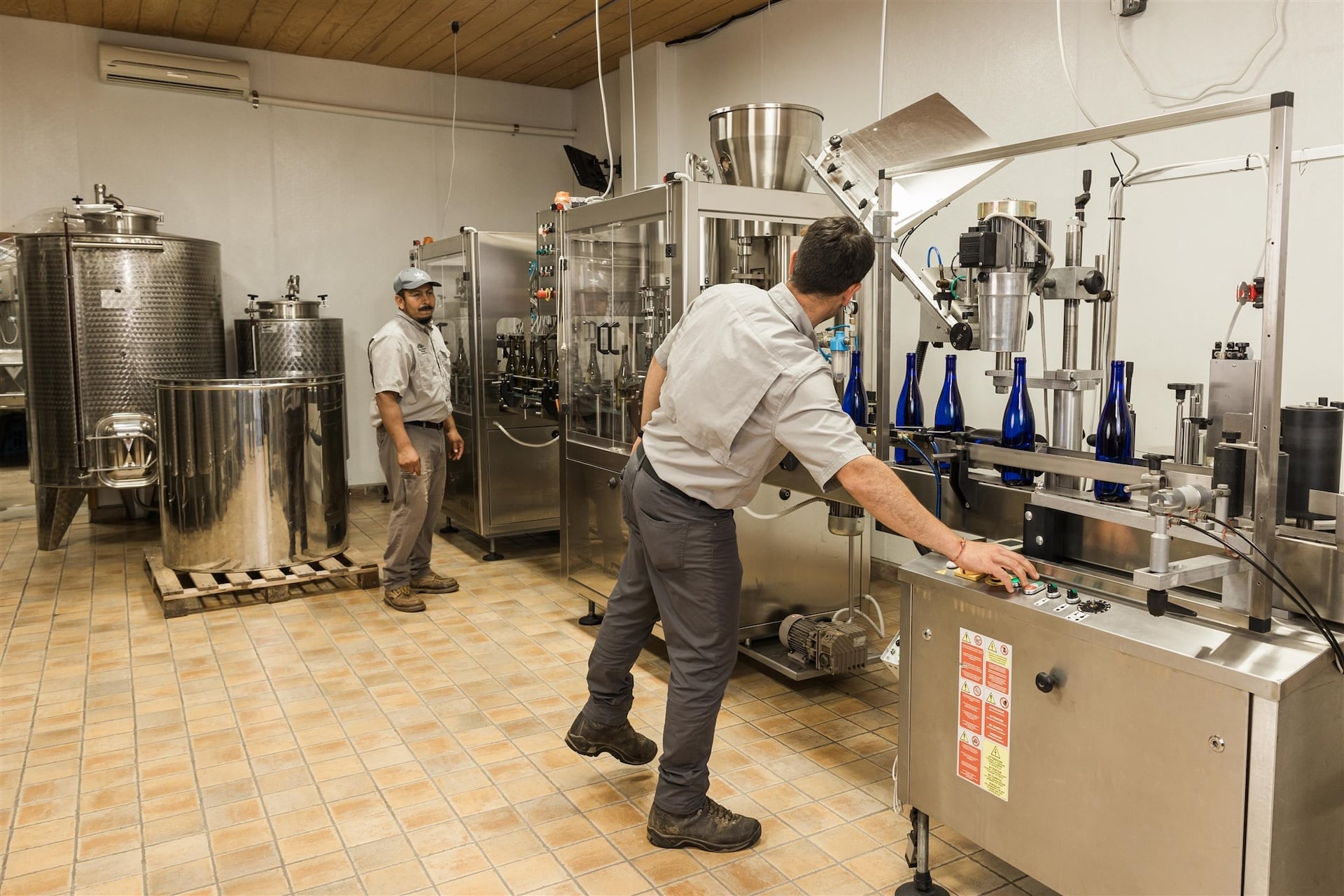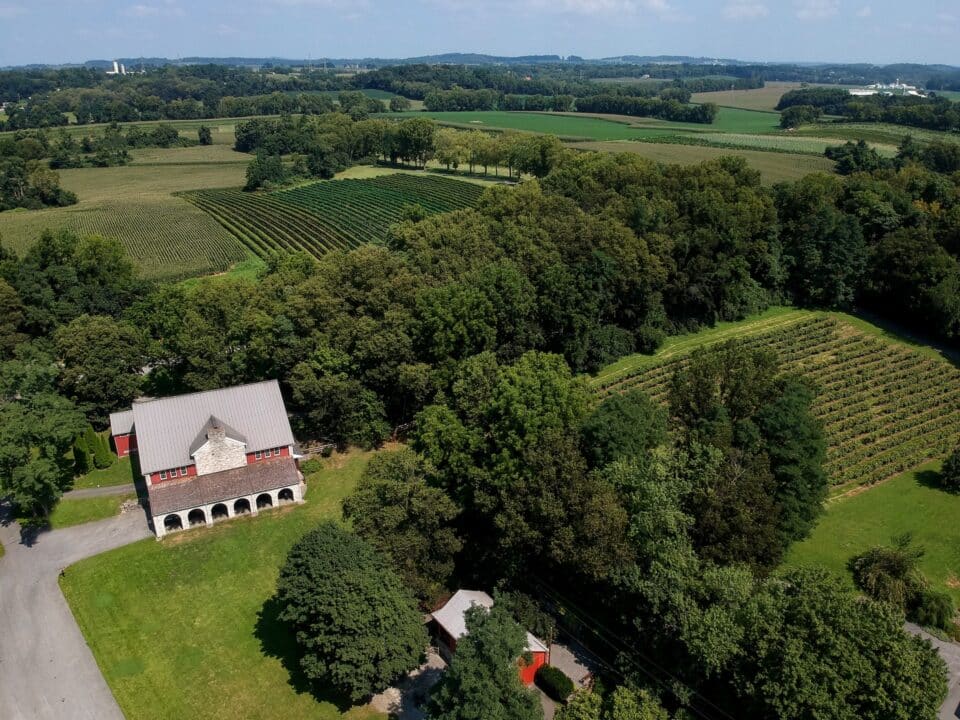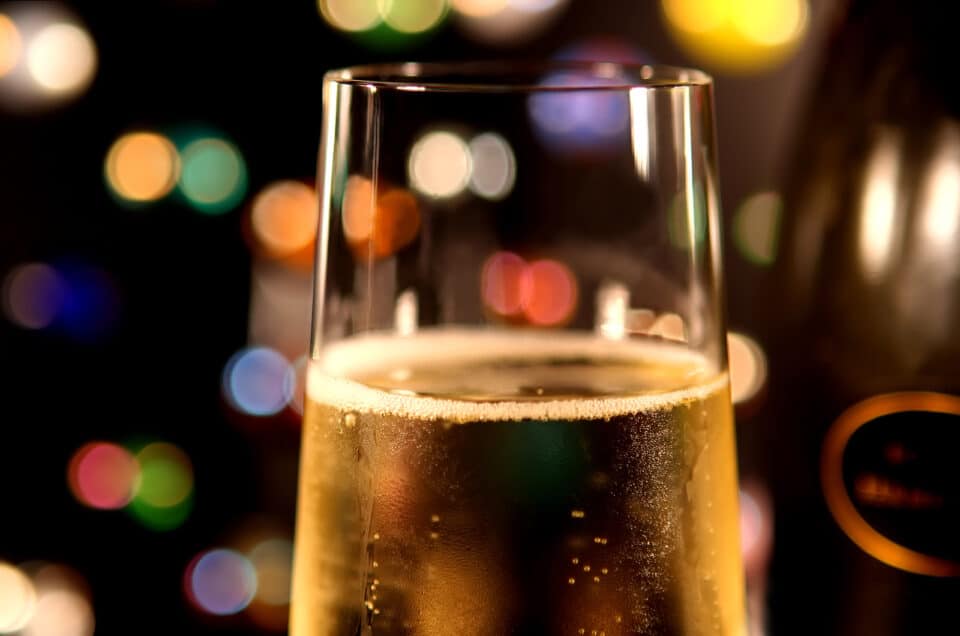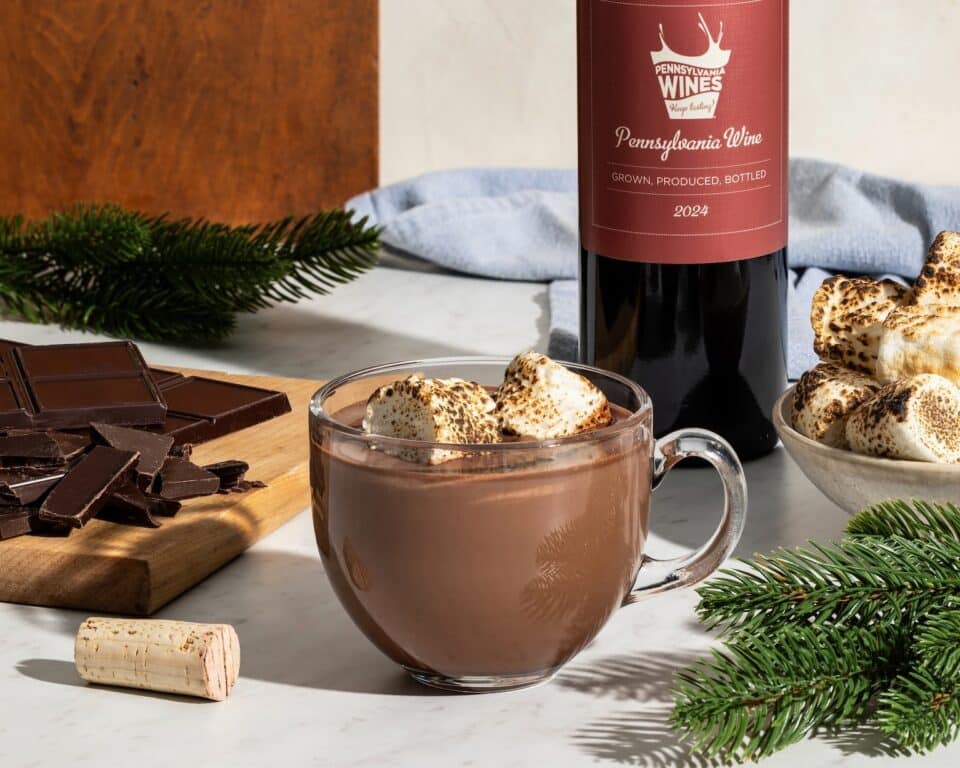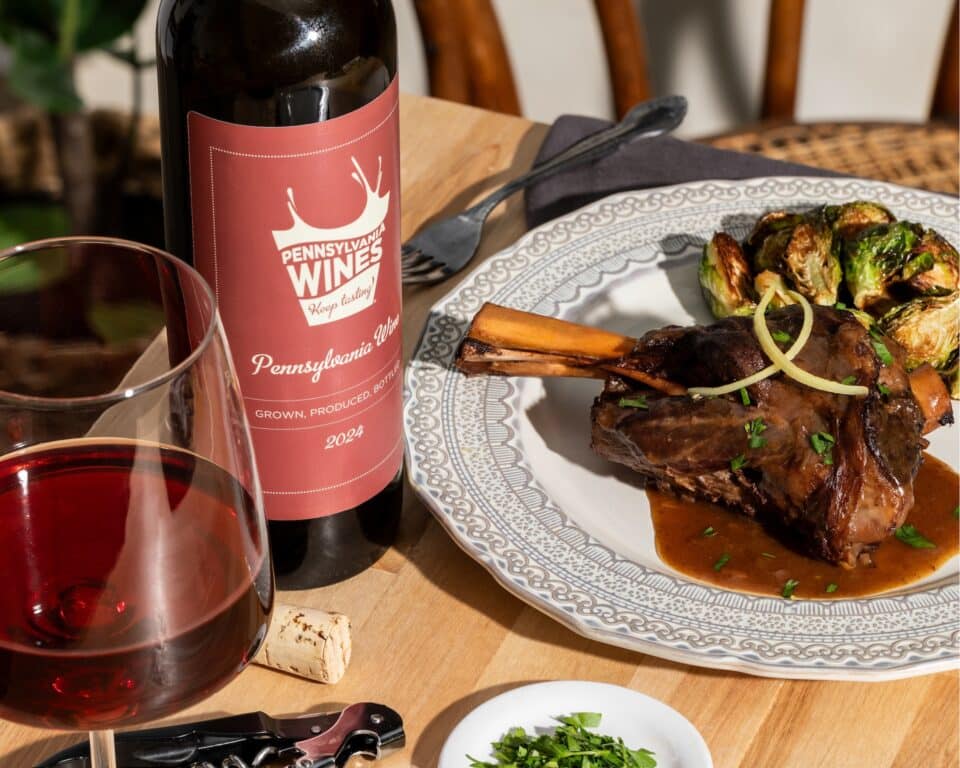Penns Woods Winery founder Gino Razzi began winemaking as a hobby, quickly finding he had quite a knack for it. He pulled his daughter, Carley, into the venture, giving her the green light to try and make a proper business with his quickly expanding portfolio. Now, just 15 years later, Penns Woods is a hopping, bustling winery with remarkable wines that draw on Razzi’s Italian roots.
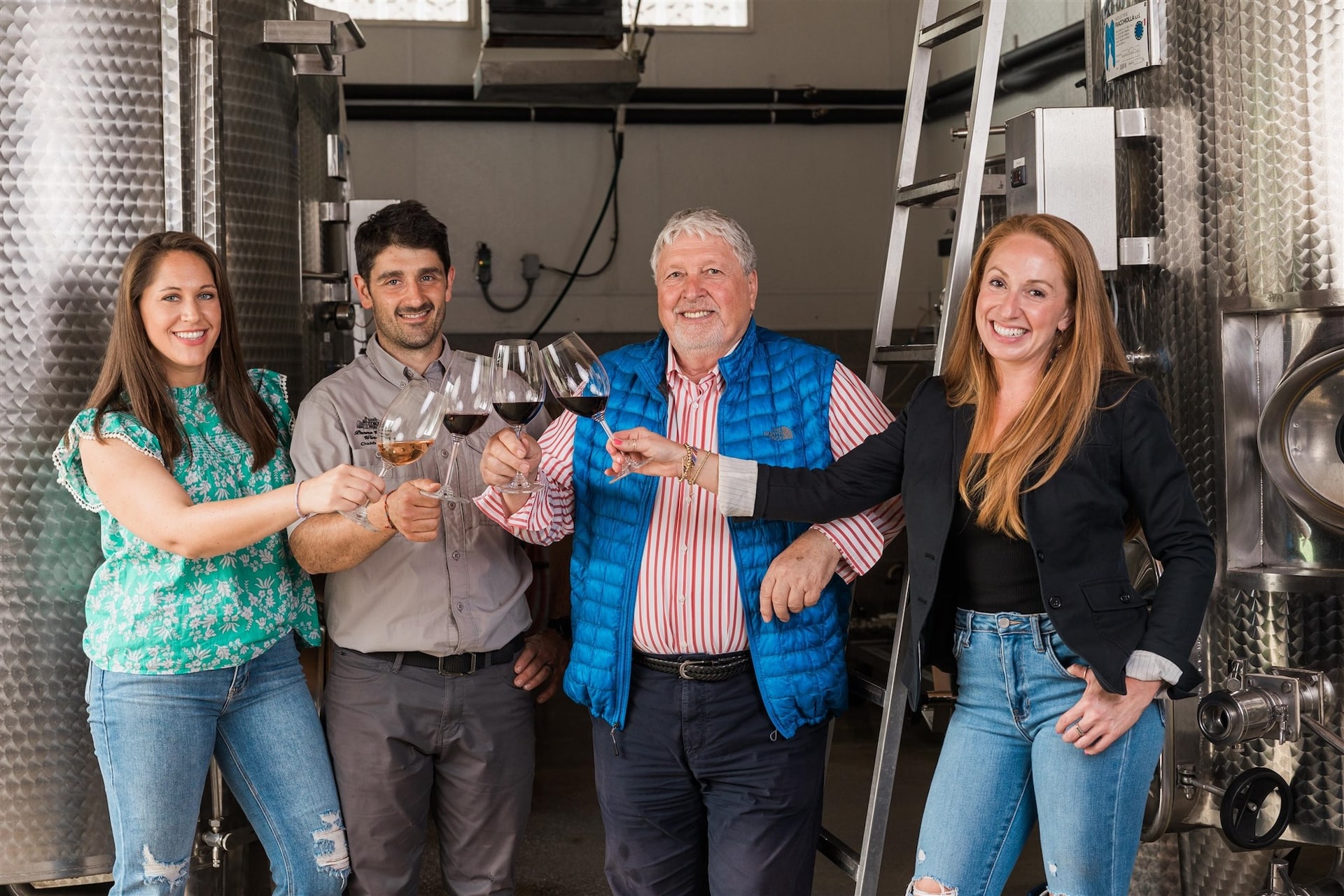
Andrea and Davide Creato and Gino and Carley Razzi of Penns Woods Winery
Early in Penns Woods’ development, the Razzis brought on winemaker Davide Creato, who has further elevated Penns Woods with his viticultural expertise, belief in Pennsylvania’s potential, and a passion for exceptionality, right in line with the Razzis’ vision. As they open their doors to an ever-growing base of consumers, they always return to the maxim, “Wine first.”
We spoke with Penns Woods’ president Carley Razzi and winemaker and vineyard manager Davide Creato about Penns Woods Winery’s evolution, their dedication to growing their own grapes, and how they’ve created an inviting, educational place for wine experts and fledgling enthusiasts alike.
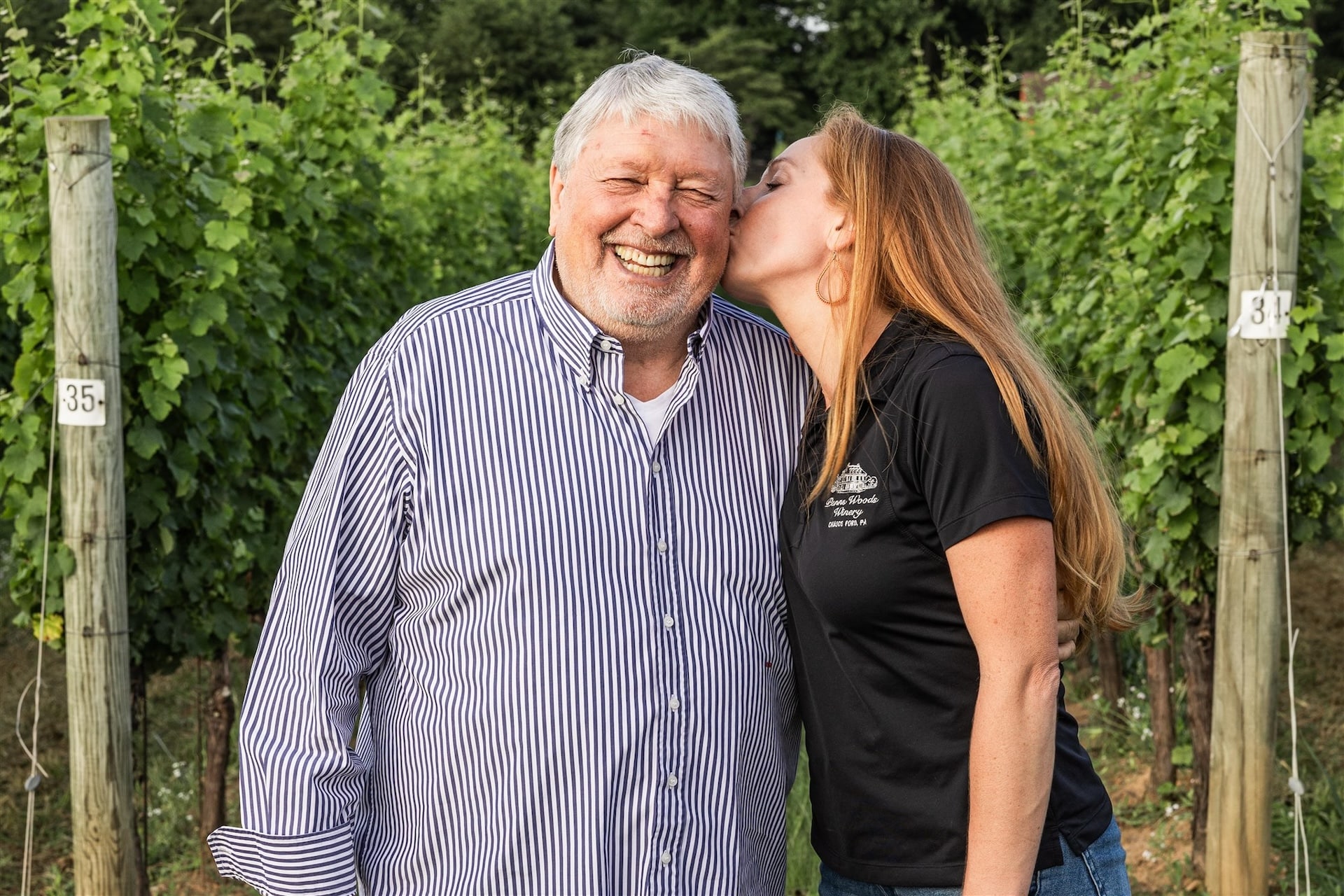
Gino and Carley Razzi
PA Eats: Can you give us some background on Penns Woods Winery?
Carley Razzi: You need my father’s backstory to understand the scene. My father is an Italian immigrant. He came over from Italy when he was 17. He couldn’t speak a lick of English and didn’t know anyone here. He had odd jobs but to pay for his education, he joined the Marines. He served in Vietnam.
After he served, he was able to go to school in California. Eventually, he made his way to the East Coast, where his sister had settled down and put in roots. There was a big Italian community in the Ridley Park area. My uncle came over too, and together they started a wine import company. Slowly, it became a larger business.
During that time, my father got the bug for wanting to make wine and try his hand in it. With his first officially released wine, Symposium, he received a 95-point rating from Wine Spectator. He wanted to continue, but he wasn’t convinced you could make good wine in Pennsylvania. The wine industry, at the time, was just starting out and laying roots down. He went to a few different wineries and the grapes were phenomenal. So he started making wine, and it was literally just a hobby.
In 2009, I was in Colorado. There were almost no jobs at the time and he said, “Why don’t you come home and work for me? I said, “No, thank you.” But I did eventually come home and gave it a try. The import work was not for me, because it felt too corporate. He said, “Well, I have wine. Why don’t you try to make this a proper business?”
At that point, it was just a little tasting room. We had a cash box and were only open on Saturdays and Sundays. In six months, I hired my first employee, Andrea, Davide’s soon-to-be wife.
We were trying to figure out the wine industry. We went around tasting wines and did everything we could to familiarize ourselves with the industry.
Creato in the vineyard
Davide Creato: I come from the same region [in Italy] as Gino, maybe 20 miles from where he was born. I grew up on a farm and working vineyards. It was an area dedicated to agriculture. I met Gino at Zaccagnini, one of the biggest wineries in the Abruzzo region, and I got to know him. He tasted my wine. I made Montepulciano and other wines in our barn. It surprised Gino, because everything was in one building. My two horses were on one side, and my tanks on the other! But, when the fruit is good, and you treat it well, the wine will show it.
The Montepulciano d’Abruzzo is our bread-and-butter in Abruzzo. With Zaccagnini, Gino took what was an unknown varietal in the United States and made it one of the more popular wines on the shelves. It really took off. I’m grateful to Gino, because he got it to its highest level.
So, after Gino tasting my wine, he invited me to intern at his vineyard in Pennsylvania. In 2011, I came here on a student visa and my first visit ended up being the year of Hurricane Sandy! I realized we were spoiled in Italy because when you stick a branch in the ground, it grows and harvest comes in just a few years. In Pennsylvania, it takes care and planning with a lot of patience.
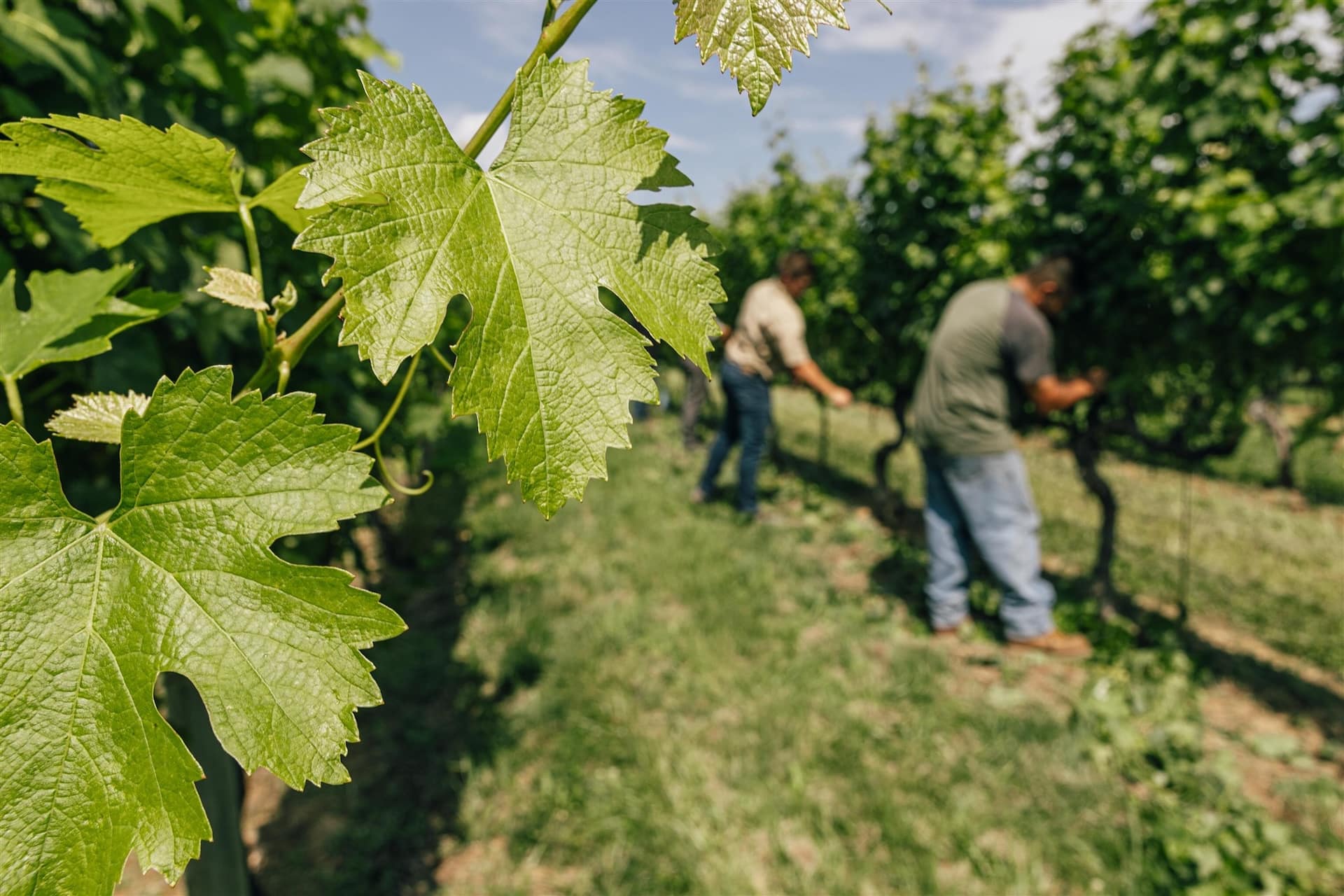
Fast-forward to now, I’m managing 40 acres, 12 varietals, and four vineyards. We’ve got all different styles — dry, sparkling, semi sweet — pretty much the whole portfolio of wine, which is pretty impossible to do in other regions.
It’s interesting to see how open the winemaking experience is on this coast. With climate change, the vines are ripening at a faster rate, and the pressure is lower. I love to see vineyards everywhere, and share culture and knowledge and learn what they’re doing for soil preservation.
Carley: A couple of years ago, the Penns Woods vineyard became part of a First State Historical National Park. It’s really exciting for us. Even though there are so many regulations involved with growing in a national park, we were super-excited. With Davide being so passionate about biodynamic farming, he had already introduced techniques that helped remove the use of fertilizers, and minimize the use of herbicides, so it was actually a really smooth transition.
The team in the vineyard
You currently have nine reds, six whites and two rosés. What are your top wines and customer favorites?
Carley: When it comes to sales, rosé is one of our top-sellers, both sweet and dry. Pink is always a hot wine. That, and Pinot Noir, something that Davide has mastered.
Another top wine is our Wildflower White, which is newer to the portfolio and was Davide’s brainchild. We used to have Traminette, which was the most popular. We grew a little of it, but needed more and couldn’t get enough in Pennsylvania. So, if we wanted to continue that wine, we’d have to reach out of state. We were trying not to do that. I told Davde, “I don’t know what to do.” So, Davide made a field blend of all the white varietals we grow here in the vineyard. It immediately trumped all the other wines. People love it. It has beautiful floral notes and smells of honey but it’s nice and crisp and clean at the finish.
We want to be able to see our own grapes, to know what goes into the wine and know that there’s the least amount of chemicals on or near them. So we’ve decided over the past six or so years to try to transition into entirely estate-grown.
Davide: We didn’t believe getting Traminette out of state would be feasible. We put together something with the crisp of Sauvignon but the nose of an aromatic varietal and everything in between. We ended up with Wildflower.
Other wines people come back for, and they make great gifts, are the Pinot Noir Reserve, the Ameritage Reserve and the Chardonnay Reserve. These wines really show how growing grapes in PA and making wines in the right way can give you satisfaction. We had Ameritage from 20 years ago. It’s amazing. The Chardonnay’s from 10 years ago. It has strength and doesn’t get flat. They’re amazing wines.
Creato pulls and pours wine with a barrel thief pipette
The varietal that we’ve invested a lot into over the past five years is Pinot Noir. We started planning in 2013, with two-and-a-half acres. Now, we have 12 acres of Pinot with 2.7 to 3.5 tons per acre. The grapes that we can get are very limited and it’s very difficult. You cannot over-crop it because then the wine won’t be fragrant and fruitful. Production is limited to 3.5 tons per acre. The skin is super-thin and, when the grapes are touching each other, they need to be moved. It takes a lot of effort to produce a good Pinot Noir. The wine we’re able to create has a beautiful nose with notes of straw and tea. It’s just an amazing wine; smooth and clean. The beauty of the Pinot, the white wine of the reds, is that it’s all about elegance and delicateness.
We’ve also made beautiful sparkling wines. 2022 was our first vintage of sparkling wine using the Charmat method, and the results were delicious.
Our three vineyards are all different from each other. The earth is sandy and golden, clay, iron-oxidized for dark red earth and silver from plated mica and schist. The sun exposure is different at each. It’s amazing working with different batches. The Merlots all taste different. Our hope is to have designation labels for our different vineyard sites. The future holds a lot of fun projects.
Can you tell us about your connections to the local community?
Carley: Community is huge for us. My dad started making wine as an ode to the community that helped him grow as a person and welcomed him into the U.S., and we’re continuing that.
When it comes to local wines, it’s our commitment to our customers, and it’s them committing to us. We’re aware that our wines are a bit higher priced. People may ask, “Why am I buying this Chardonnay, which is very good, for $30 when I can get it for $10?” This is because it’s from your backyard. We’re trying to build our wine region to become more recognized. So everything is small-batch. It’s more expensive. Smaller quantities, more labor, and more care goes into the vines. As a small business, it’s very important for us to support the local community so they support us.
Davide: With wine, to sell at $10 a bottle you have to jump a lot of steps. You’re adding more to the wine, limiting the flavor, and there’s something outside of the grapes that you have to introduce, like alternative stabilizers. Oftentimes, large-production wineries have to add more to their wines to reduce the cost.
At a grocery store, with small-batch items, you’re getting something local and it’s going to be a higher price. We’re really trying to educate, and the best way to educate is by staying grassroots and face-to-face with the community.
We have a limited winery license. Limited wineries were created to help the farmers. Local wines are competing with imported wines, and we’re working on that as a bigger picture. We’re really focused on wanting to improve the overall wine community. We want Pennsylvania recognized as much as Virginia and New York. We need our legislators to help us, and to protect agriculture. The restaurant industry has to help us, too, and carry PA wines on their menus. In Europe, the wine industry is tied very closely to the restaurant industry. I wish that more restaurants here would serve local wines.
What sets Penns Woods apart from other wineries? What are its specialties and what keeps people coming back?
Carley: I think it’s a combination of factors that are bringing people back. One: wine. If the quality isn’t there, no one’s going to drink it.
We also like to provide an experience for our guests. Andrea and I had a vision for the tasting room. She had worked part time in Georgia for a winery and, seeing the local side of it, she brought in great insights. From working in the import business, I saw that there can be a pretentious stigma [in the wine industry]. If you can’t pronounce it, most likely you won’t order it. We make great wine, and we know a lot about wine. If you’re a connoisseur, you can come in and talk intelligently about wines with our staff. However, if you don’t know about wine, if it’s your first tasting, you can come in and have an equally great experience. Let us teach you, and don’t feel like you don’t know enough. Wine is fun and enjoyable for anyone, whether you’re just turning 21 or you’ve been drinking wine your whole life.
Bridget Cain and Brenn McCans with Wine Club members
At the end of the day, wine always comes first. Gino is old-school. He was hesitant about the events and music. The tasting room in the beginning was a bar and a wine rack. Slowly we convinced him that people don’t want to just stand there. At first he said, “Okay, a table – no chairs.” So there was a big learning curve on both sides. We told him, we’re not France, Italy or California. We really need to teach people about the nuances in our PA wines and encourage them to enjoy them!” He eventually agreed, but always reminded us: “Wine first.”
Davide has followed in Gino’s footsteps. My dad has mentored him and Davide has brought in modern techniques and new things that we’ve been learning and putting into the wine. It’s been a neat combo.
Cornelio Hernandez and Davide Creato in the bottling facility
Davide: I have friends in Europe – Italy and Spain – and they’re even revisiting what they’re doing there. They want people to learn more about wine. We’re coming from a generation that had a bottle of wine on the table. It didn’t matter what, there was always a bottle sitting on the table. The new generation doesn’t have that kind of culture. For those our age and a little younger or older, we explain and give them knowledge on how we do things, why we do things and what we do in the vineyard.
The current generations are so removed from agriculture – they see a bottle of wine but didn’t look into how we get it there. What’s the fermentation process look like? What’s the wine smell like when it’s fermenting? Education is very important, whether you are in the U.S. or Europe.
Putting a lot of energy into the vineyards is the key to success; keeping it as natural as possible.
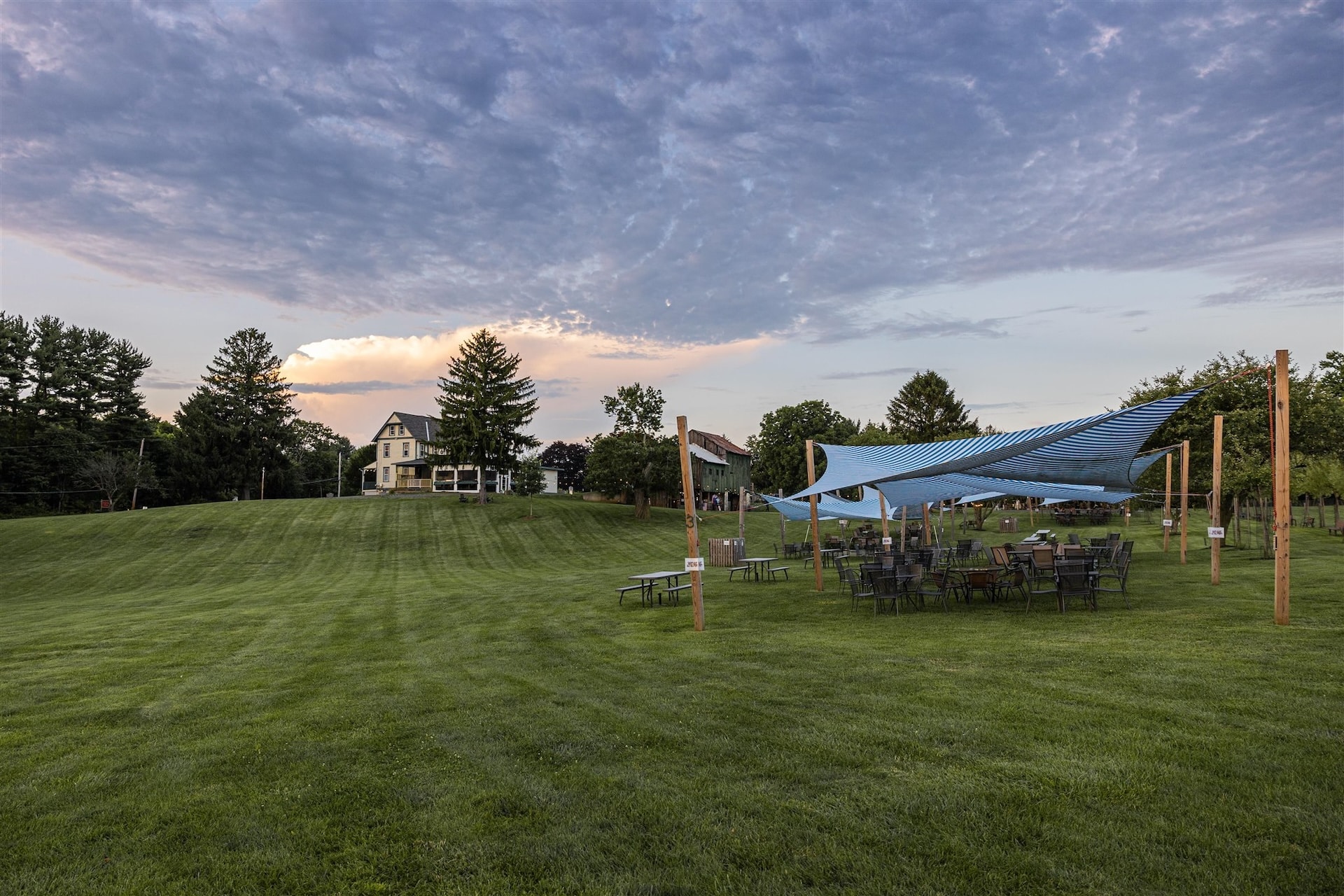
Penns Woods Winery, located in Chadds Ford, offers space to stretch out or cozy up on its lawn (with shade sails required for groups over 10), in the pavilion with fire pits and in the tasting room. Its chock-full events calendar includes live music all summer, tours, trivia, yoga and more. Its Christmas in July Food Drive benefits the local West Chester Food Cupboard.
Visit Penns Woods Winery at 124 Beaver Valley Rd. in Chadds Ford, PA: phone: (610) 459-0808.
The PA Vines & Wines series was created in collaboration with the Pennsylvania Wine Association with Round 8, Act 39 grant funding from the Pennsylvania Liquor Control Board (PLCB).
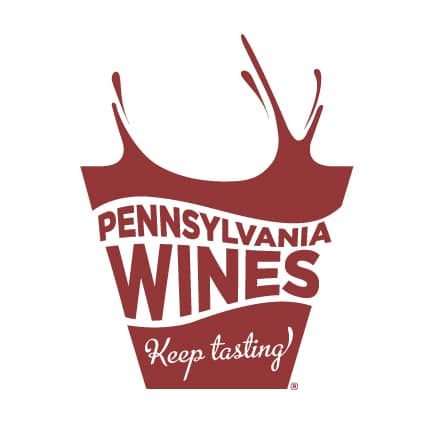
The Pennsylvania Winery Association (PWA) is a trade association that markets and advocates for the limited licensed wineries in Pennsylvania.
- Photos: Penns Woods Winery
